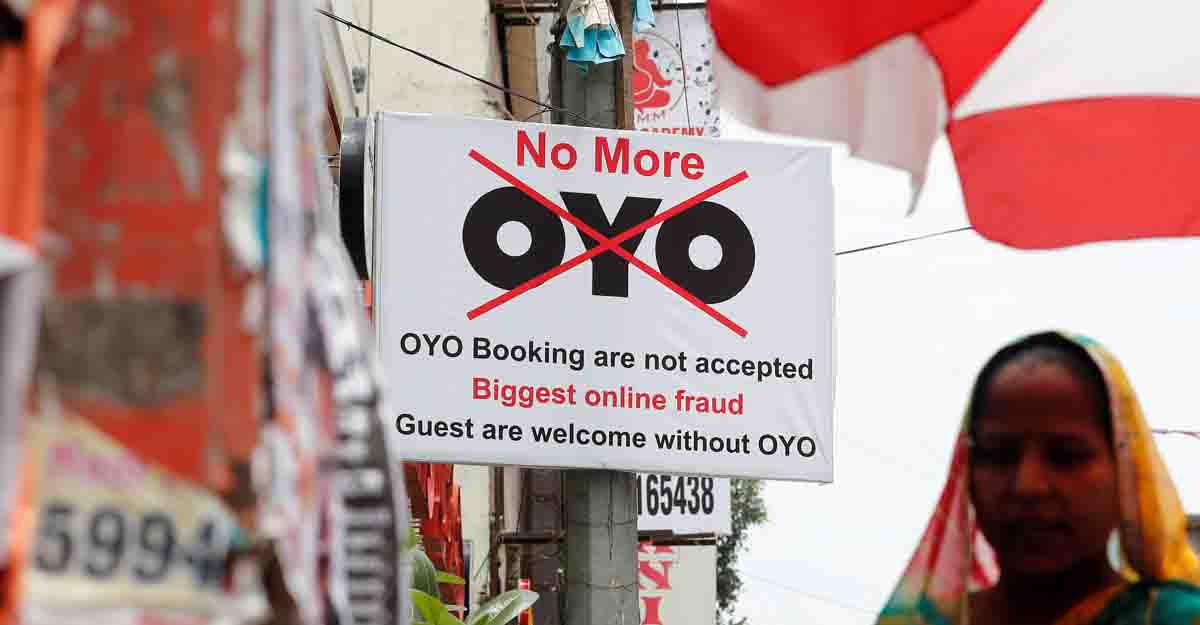The tale of Oyo’s bankruptcy

The tale of Oyo’s bankruptcy
Less than a month ago, we read about how OYO hotels’ valuation climbing through the roof for the second time after it raised USD 7 million in its latest fundraiser campaign, taking the hotel chain’s valuation to a total of USD 9 billion. Recently, we saw a pdf and text message doing rounds on social media platforms that claimed that the Soft bank-backed Oyo hotels have filed for bankruptcy.

The Internet sure is a confusing place, look at how the tables turned. Well, to give some relief to our baffled heads, Ritesh Agarwal, the founder of Oyo recently released clarification on the matter stating that the bankruptcy rumours are in fact, only rumours. “There is a pdf and text message circulating that Oyo has filed for bankruptcy.
This is absolutely untrue and inaccurate. A claimant is seeking Rs 16 lakh from Oyo’s subsidiary leading to a petition at NCLT,” tweeted Ritesh Agarwal tweeted earlier this Wednesday. Wait, what petition? And where did this rumour come from? Let’s find out.
The speculation on social media platforms about Oyo’s bankruptcy proceedings was sparked by the National Company Law Tribunal’s (NCLT) order over a claim of Rs 16 lakh in dues by a hotel owner.

The said order, however, has been passed against Oyo Hotels and Homes (OHHPL), a subsidiary of the parent company of Oyo- Oravel Stays. Before we go into detail on the matter, it is important to note that The National Company Law Tribunal is a quasi-judicial body in India that adjudicates issues relating to Indian companies.
The tribunal was established under the Companies Act 2013 and was constituted on 1 June 2016 by the government of India to deal with credit non-payment and bankruptcy problems of Indian companies in an attempt to solve the country’s twin balance sheet problem, which, however, has evolved into a four-balance sheet problem.
This order was based on the claim of an operational creditor, Rakesh Yadav, who filed a petition against Oyo Hotels and Homes over non-payment of dues amounting to Rs 16 Lakh at the National Company Law Tribunal.
The order was pronounced earlier this month after the tribunal bench decided that OYO didn’t pay the dues as per the merits of the case. As a result, as per the Insolvency and Bankruptcy Board (IBB) of the country, the corporate insolvency resolution process was initiated by the tribunal. “The order has been passed based on an application filed by an operational creditor. An amount of Rs 16 lakh is outstanding,” said Keyur Jagdishbhai Shah, who signed the NCLT order. “The order reserved was pronounced on April 1.
Based on the merits of the case, the NCLT bench decided that Oyo didn’t pay the dues. So as per IBC, CIRP was ordered,” said the signee of the Ahmedabad branch of the National Company Law Tribunal. The Corporate Insolvency Resolution Process is a recovery mechanism made available to creditors under the Insolvency and Bankruptcy Code.

Thus, as per the orders, the creditors of Oyo Hotels and Homes have been asked to submit their claims to the interim resolution professional before April 15. Keyur Jagdhishbai Shah, who is part of Keyur J Shah & Associates, has been appointed as interim resolution professional (RP) of the insolvency process. The RP will assume control of Oyo subsidiary OHHPL, including its assets, invite claims from all creditors, and constitute the Committee of Creditors (CoC).
Oyo however has denied the claims by declaring that the claimant has already banked the said amount Rs 16 lakh and is under protest to the said decision. Thus, to challenge the insolvency plea against Oyo Hotels and Homes, the Oyo founder Ritesh Agarwal has announced that they’ve sought their appeal with the National Company Law Appellate Tribunal.
It is the designated appellate forum for orders passed by the National Financial Reporting Authority and Competition Commission of India and is under the original jurisdiction of the National Company Law Tribunal, meaning that the cases can not directly come to the NCLAT. Oyo has claimed that the claimant has sought the petition out of a commercial dispute and is rather a reconciliation issue more than anything else.

It has further claimed that Oyo is recovering from the pandemic steadily and their largest markets are operating profitably. “We are surprised to hear that the honourable NCLT has admitted a petition against OHHPL, a subsidiary of Oyo for Rs 16 lakh in a contractual dispute, which dispute is not even with this subsidiary,” an Oyo spokesperson said and added: “Oyo is on a steady path of a resurgence in 2021. We are seeing signs of recovery across geographies and our balance sheet is well-funded with our largest markets operating profitably.”
The spokesperson further said Oyo’s global business is earning the same gross profits dollars since January this year as it did pre-Covid in January 2020. “Our survival through the Covid crisis and resurgence clearly indicate that we are a company with strong fundamentals and high-value potential,” the spokesperson added in an attempt to ensure redressal against the insolvency plea.
This initiation of insolvency plea against the hospitality chain’s subsidiary led to the incorrect reports claiming that the entire OYO group had filed for insolvency, which, however, is not credible for the subsidiary alone itself considering they’ve applied to challenge the plea against insolvency and the creditors’ claims are yet to be declared true, given that the National Company Law Tribunal has only admitted the petition on the basis of its merits.





